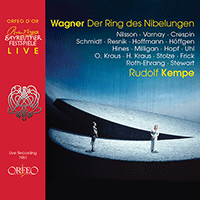Regine Crespin
When Régine Crespin was five, her parents moved to Nîmes, where they opened a large shoe shop. Her mother, an alcoholic, hoped that she would become a pharmacist; but when this ambition was thwarted by Crespin’s failure to gain her Baccalauréat at the age of sixteen, her father agreed that she could study singing. Her first lessons were with a Madame Lossa, and after three years she entered the Paris Conservatoire where she studied with Suzanne Cesbron-Viseur (a pupil of Pauline Viardot- Garcia), Georges Jouatte and the distinguished bass Paul Cabanel. In 1950 Crespin won first prize for both opera and opéra-comique singing and second prize for singing; but unusually was not immediately offered a contract with the Paris Opera. She had however already made her professional operatic stage debut, in 1949 as Charlotte / Werther at Reims, and in 1950 she successfully sang Elsa / Lohengrin at Mulhouse.
Now Crespin was contracted by the Paris Opera, where she made her debut in 1951 as Elsa, swiftly followed by her first appearance at the Opéra-Comique as Tosca and then Santuzza / Cavalleria rusticana. Her reception in Paris however was cool and in 1952 she took the decision to perform in the French provinces, where she developed her technique and extended her repertoire, with her interpretation of the Marschallin / Der Rosenkavalier winning especial praise. She returned to the Paris Opera in 1955 to sing Reiza / Oberon, to great acclaim. During the following three years Crespin enjoyed further success there as Desdemona / Otello, Amelia / Un ballo in maschera, Brunehild / Sigurd (Reyer) and Lidoine in the first performances of Poulenc’s Dialogues des Carmélites (1957). Wieland Wagner invited her to sing Kundry / Parsifal at the 1958 Bayreuth Festival: her success resulted in return invitations to sing Kundry in 1959 and 1960 and Sieglinde / Die Walküre in 1961.
1959 was the year of Crespin’s international breakthrough, with debuts at La Scala, Milan in the title role of Pizzetti’s Fedra, at the Vienna State Opera as Sieglinde and the Marschallin, and at Glyndebourne as the Marschallin, the role with which she also made her Covent Garden debut in 1961. She returned to the Royal Opera House to sing Elsa (under Klemperer), Tosca and Leonore / Fidelio. Crespin’s American debut came in 1962 as Tosca with the Chicago Lyric Opera, where she returned to sing Leonore, Elisabeth / Tannhäuser and the title role in Ariadne auf Naxos. She first appeared at the Metropolitan Opera in late 1962, singing there annually until 1981 (except in 1974), her roles including the Marschallin, Carmen, Charlotte, Elsa, Kundry, Santuzza, Giulietta / Les Contes d’Hoffmann and Senta / Der fliegende Holländer. Crespin’s final appearance at the Met was in 1987, as Madame de Croissy in Dialogues des Carmélites, which she had also sung at Covent Garden in 1983.
Other major international companies with which Crespin had close relationships included the Teatro Colón, Buenos Aires where she sang Fauré’s Pénélope, Gluck’s Iphigénie (en Tauride) and Berlioz’s Dido in Les Troyens; and Kurt Adler’s San Francisco Opera. In 1969 she made her debut at the Salzburg Easter Festival at the invitation of Herbert von Karajan, singing Brünnhilde / Die Walküre. Undertaking this arduous role may have affected her voice, as in 1970, also the year in which her marriage ended, she began to experience vocal difficulties.
Now Crespin gradually moved into the mezzo-soprano repertoire, for instance as Dulcinée in Massenet’s Don Quichotte; and at the same time was able to display her fine sense of comedy in works by Offenbach, such as La Grande-Duchesse de Gérolstein and La Périchole. Other roles successfully assumed in this later phase of her career included Madame Flora / The Medium and The Countess / The Queen of Spades, with which she made her final appearance at the Paris Opera in 1989, the year of her retirement from the operatic stage. Having already begun to teach at the Paris Conservatoire in 1974 Crespin continued there until 1994, while also giving master-classes during her later years throughout Europe and the United States. Although she overcame bouts of cancer in 1978 and 1984, her death in 2007 was eventually caused by liver cancer.
Possessing a magisterial voice, figure and personality, Crespin was unique amongst her contemporaries in being equally at home in the major soprano roles of the French, German and Italian repertoires. Capable of both high drama and exquisite delicacy in her singing and acting, she was truly one of the great post-war singers of the international operatic stage.
© Naxos Rights International Ltd. — David Patmore (A–Z of Singers, Naxos 8.558097-100).

















